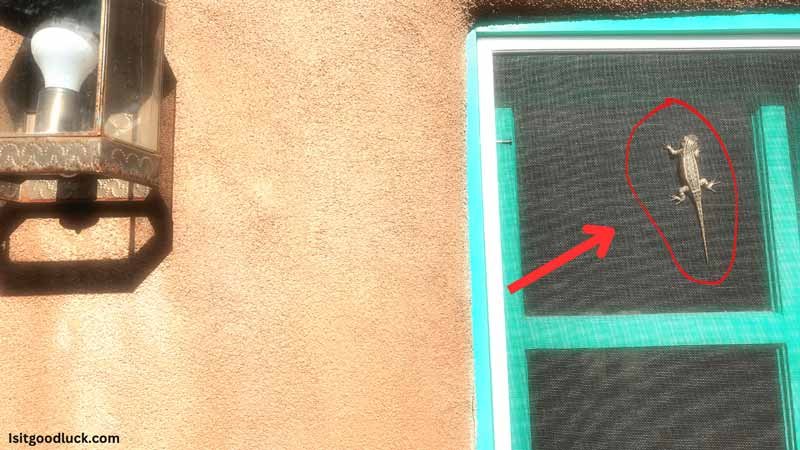Lizards—these little, scaly, cold-blooded creatures—pop up across the globe in various ecosystems. Depending on your cultural background, spotting a lizard may be a regular or rare spectacle.
While lizards are often characterized as household pests, many cultures regard them as potent symbols of prosperity and good luck.
This article will delve into the various cultural beliefs and superstitions surrounding lizards and explore the intriguing question: Is it good luck to see a lizard in your house?
Contents
- 1 Exploring the Cultural Tapestry: Lizards as Symbols
- 2 Science or Superstition: The Lucky Lizard Debate
- 3 Beyond Good Luck: The Multifaceted Lizard
- 4 Lizards Unwelcome: Steps to Eradicate Them
- 5 Conclusion: Is It Good Luck to See a Lizard in Your House?
- 6 FAQs
- 6.1 What types of lizards are commonly associated with good luck?
- 6.2 Are there any cultures where lizards are seen as bad luck?
- 6.3 Are there specific circumstances where seeing a lizard is considered lucky?
- 6.4 If I don’t believe in luck, should I still let lizards live in my house?
- 6.5 I just saw a lizard in my house. How can I increase my chances of getting good luck?
Exploring the Cultural Tapestry: Lizards as Symbols
Across multiple cultures, lizards are viewed not just as straightforward creatures but as meaningful symbols carrying spiritual significance.
1. The Chinese Perspective: Symbols of Wealth
In China, lizards are considered a symbol of wealth and prosperity. The Chinese believe that if a lizard crosses your path or you spot one in your house, it is an omen of impending wealth.
2. The Japanese Belief: Longevity and Health
On the other hand, Japanese culture associates lizards with longevity and good health. According to traditional Japanese beliefs, a lizard sighting at home is thought to predict recovery from illness or the extension of a healthy lifespan.
3. Indian Lore: Protective Symbols
In India, lizards, specifically the ‘Chipkali’ or the common house gecko, are essential in Hindu mythology. Lizards are believed to ward off evil and act as protectors against misfortune. Seeing a lizard in your house is often considered a good omen and a signal of good luck around the corner.
Also read: Is it good luck to see a turtle?
Science or Superstition: The Lucky Lizard Debate
Is it scientifically verifiable that seeing a lizard in your house brings good luck? The truth is, no. There is no empirical evidence to support this claim.
However, many people believe in the power of these superstitions, and they shape individuals’ perceptions and experiences in many ways.
Choosing to interpret the appearance of a lizard in your home as a sign of good luck, prosperity, or protection is a personal choice.
It’s a matter of individual beliefs and cultural influences. Ultimately, you are the one to decide what the presence of a lizard in your house means to you.
Beyond Good Luck: The Multifaceted Lizard
In addition to being symbols of good luck, lizards often symbolize transformation, change, wisdom, and protection. The ability of some lizards to shed or regenerate their tails symbolizes resilience, regeneration, and growth.
If a lizard scurries into your line of sight at home, it might be worth considering these additional meanings. Could it be indicative of a forthcoming period of change? Or does it serve as a reminder to guard your interests and loved ones more fiercely?
Lizards Unwelcome: Steps to Eradicate Them

While we’ve mainly focused on the positive connotations of lizards, it’s essential to acknowledge that not everyone may be thrilled by their presence at home.
If you’re among those who would rather not have them around, several measures can be taken to eliminate them from your living spaces.
You can seal cracks, gaps, and crevices in your house through which lizards can gain access. Repellents and traps are also practical options to prevent their intrusion.
However, it’s crucial to remember that lizards play a role in the ecosystem by preying on insects and other pests, serving as natural pest control.
Conclusion: Is It Good Luck to See a Lizard in Your House?
To conclude, the debate on whether the presence of a lizard in your house symbolizes good luck is a matter of personal interpretation.
There’s no scientific proof to affirm this notion, yet the belief holds substantial power and meaning for many. It’s ultimately up to you to determine what seeing a lizard in your home signifies.
Your prerogative is whether you view them as bearers of good luck, harbingers of change, or simple reptilian creatures.
In the grand tapestry of human culture and superstition, the humble lizard is a potent reminder of our innate desire to find meaning and luck in the world around us—even in the slightest, most unexpected places.
Also read other articles regarding animals good luck
FAQs
What types of lizards are commonly associated with good luck?
The association of lizards with good luck does not generally discriminate between species. However, the type of lizard associated with a good fortune can depend on regional fauna and local cultural beliefs. For instance, the common house gecko is often associated with good luck in many parts of Asia.
Are there any cultures where lizards are seen as bad luck?
Yes, there are cultures where lizards are considered a bad omen. For instance, in some parts of Africa, lizards, especially those found inside the house, are viewed as harbingers of bad luck, ill health, or misfortune.
Are there specific circumstances where seeing a lizard is considered lucky?
In certain cultures, the timing and location of a lizard sighting may affect its significance. For instance, in some Indian beliefs, a lizard falling on the right side of a man or the left side of a woman is considered auspicious.
If I don’t believe in luck, should I still let lizards live in my house?
Lizards can benefit your house by eating various insects and pests. However, if you’re uncomfortable with their presence or an infestation, you may want to consider humane removal methods.
I just saw a lizard in my house. How can I increase my chances of getting good luck?
The belief in lizards bringing good luck is based on superstition, so there isn’t a concrete method to “increase” your good luck. However, being open to positive outcomes and maintaining a positive mindset can help you perceive and capitalize on opportunities, which some may attribute to “good luck.”








